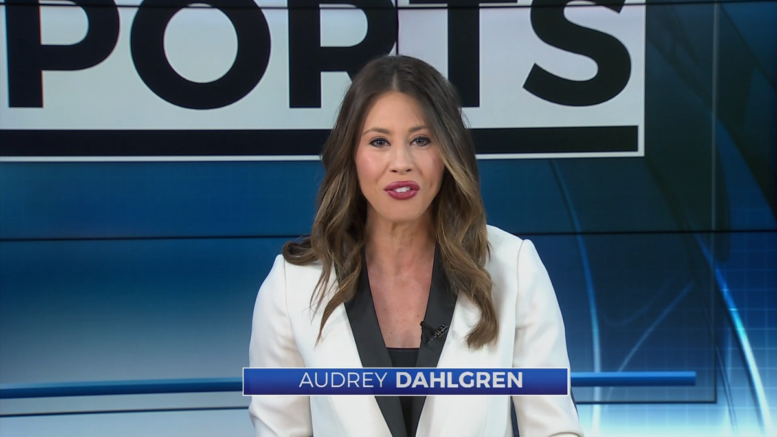Last Thursday, sports reporter Audrey Dahlgren had a very bad day, by journalistic standards. After attorneys for Mel Tucker, the recently fired head football coach at Michigan State, released 98 pages worth of text messages sent by Brenda Tracy — an anti-rape advocate who filed a Title IX complaint against Tucker for sexual harassment — sent to a deceased assistant and friend. On Monday, a Michigan judge granted Tracy a temporary restraining order, preventing Tucker or his lawyers from releasing any additional texts until an October 17 hearing. Tracy claims the texts were obtained illegally.
After the texts came out, Dahlgren, who was employed by Lansing TV station WLNS, took to Twitter not only to share the news on the texts’ release but also to add her own editorial thoughts on the case, at one point accusing Tracy of “lying” in the course of the Title IX investigation. While all of Dahlgren’s tweets on the matter have been deleted, they didn’t fail to grab the attention of other reporters (including Kenny Jacoby, who broke the Tucker story for USA Today) and fans, many of whom emailed our tips line to complain about Dahlgren’s lack of objectivity. She was, after all, the sports director for WLNS at the time, and was supposed to at least have the appearance of impartiality. But Dahlgren’s tweets read more like an impassioned defense of Tucker.
On Friday, WLNS fired Dahlgren. Thus far, the station has not responded to Deadspin’s request for comment. Neither did Dahlgren.
The replies to both Jacoby’s and Dahlgren’s tweets are a master class in the problem with sports journalism in 2023. At a time when investigative reporting is needed more than ever, sports journalism is heading in exactly the wrong direction, replacing journalists with “broadcasters,” “content creators,” and even AI bots. Just last week, Elon Musk asked why people should still read the news when they could just hop on X (formerly Twitter) and see what people are saying about any given event.
The answer, of course, is that journalists have a code of ethics, editors, fact-checkers (if too infrequently these days), and a mandate to make sure a story is fair and accurate. As you can see by the flaming trash heap of misinformation that is X these days, @fatass6969 is not held to those same standards, no matter how much he might insist everyone but him is infected with the woke-mind virus. Sheeple.
But the variety of opinions regarding Dahlgren’s tweets illustrates just how badly sports media outlets have dropped the ball, and the biggest reason are the attempts to turn outlets — many that once took pride in their rigorous journalism — into mega profit-making machines. In the last few decades, staffing at media outlets across the country has been decimated. That means fewer people doing the same amount of jobs, and that means the same journalists wearing different hats. Sometimes you’re a reporter, sometimes you’re a columnist, sometimes you share news on your social media feed, but other times you share your opinions on what’s happening in the news.
What it’s left us with is a complete erosion in the public’s understanding of the roles of journalists. When are we supposed to be objective? When are we allowed to put some of ourselves into our work? Do journalists really have to treat both sides equally? Or should we be beholden to a high goal — that of getting to the truth, even if the truth is one-sided? It’s a debate happening all over journalism these days, but the viewing/reading public is largely left out of the conversation and in the dark about the nuances of covering sports in the internet age.
Complicating the matter is how many outlets have aligned themselves with team “partners,” be it ESPN and the NFL or the local sports station and any given city’s pro team. All those “exclusive” interviews with athletes and front-office personnel come with a price. Too often that price is to carry water for the team when needed, and not to rock the boat during difficult conversations. There’s a reason Adam Schefter gets all the NFL scoops, and it’s the same reason he lobbed softballs at Greg Hardy following Hardy’s domestic violence suspension. Those who play the game reap the rewards. Toe the company line (the team’s line) and you can rise through the ranks. But for the troublemakers who want to talk about uncomfortable topics and actually investigate and report? They aren’t long for the industry.
Sports media has basically evolved into two tracks for aspiring journalists — you can report straight news, talk only X’s and O’s, and do what you can to hype up the team, and stay in their good graces, or you can choose to report on less savory topics, like PEDs, racism, financial misdeeds, and violence against women in sports, and you’ll find your opportunities fewer and farther between. Oh, and if you go that route, the team will hate you, and so will all the fans. That’s not to say that there aren’t people doing the latter spectacularly — Jacoby, Katie Strang, and Jim Trotter come immediately to mind, but it’s a much harder row to hoe.
All of this is a problem because sports have never just been about sports. Sports is where this country works through so many of our social and racial biases. Baseball integrated before much of America did. Billie Jean King introduced the idea of gender equity to many sports fans, and the USWNT took the ball and ran. WNBA players ousted a U.S. Senator and got her replacement elected in 2020. Just today, we learned that NHL players are gearing up to push back on the league’s ban on displaying LGBTQ+ pride tape on their sticks. Sports isn’t just about sports, it’s about who we are as a people. What we value.
I’d love to call for sports media outlets to start hiring journalists back to the newsrooms, to have clearly defined roles for everyone, reporters, columnists, and bloggers alike. I’d love for a public campaign educating the public on media literacy. I want the owners of media outlets to invest in the product they so desperately want to sell as much as the apparatus to sell it. But that ship feels like it sailed long ago. And the more the lines between journalism and “content creation” blur, the worse off we are for it.
Original source here
#Michigan #network #fires #sports #director #Mel #Tucker #analysis #read #work





